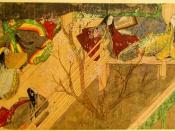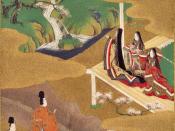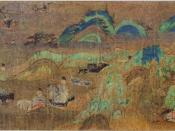Genji Monogatari is the greatest single work in Japanese literature. It provides us with an informative look into the court life of the Heian Period, as well as give us a wealth of vivid characterizations along the way to developing the lineage of the hero, Genji. The reason for its being qualified as a classic is not the fact that it was the first novel, or its twisting plot line. It is Murasaki's subtle insights into the medieval Japanese way of life and thought that give this novel its immortality. Genji manifests the idea of mono no aware, loosely interpreted as a 'sensitivity to things'(Varley, 1973, p.48), or more specifically, 'the kind of emotional response to the beauties of nature or the more gentle of human relations that was likely to elicit such an expression of spontaneous feeling as 'Ah!''(Varley, 1973, p.48) The 'gentle human relations are those events that give the basis for the escapades of Genji, but it is the more subtle use of nature that gives us the backdrop for the story (and, incidentally, the basis for a paper).
The first way that Murasaki employs nature is in her precise characterizations of the dozens of main and minor players in Genji. From the season in which the character appears to the clothes that they wear to the portion of Genji's palace that they inhabit, without a more than casual appreciation to nature in reading this novel a great chunk of the literary value is lost. '[Murasaki} is not content simply to describe the charms of the different seasons, but they are skillfully harmonized with the feelings of the characters' (Shinkokai, 1970 p.55). The first example of this is in the Broom Tree Chapter (Chapter 2) in the conversation that Genji and To no Chujo carry on...



Great essay
I read the book but i was confused by it. you r eassay was informative and interesting. i enjoyed your essay, great job!
3 out of 3 people found this comment useful.